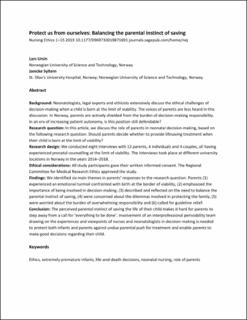| dc.contributor.author | Ursin, Lars Øystein | |
| dc.contributor.author | Syltern, Janicke Marita | |
| dc.date.accessioned | 2020-04-06T16:53:19Z | |
| dc.date.available | 2020-04-06T16:53:19Z | |
| dc.date.created | 2019-10-31T23:16:15Z | |
| dc.date.issued | 2019 | |
| dc.identifier.citation | Nursing Ethics. 2019, 1-15. | en_US |
| dc.identifier.issn | 0969-7330 | |
| dc.identifier.uri | https://hdl.handle.net/11250/2650541 | |
| dc.description.abstract | Background:
Neonatologists, legal experts and ethicists extensively discuss the ethical challenges of decision-making when a child is born at the limit of viability. The voices of parents are less heard in this discussion. In Norway, parents are actively shielded from the burden of decision-making responsibility. In an era of increasing patient autonomy, is this position still defendable?
Research question:
In this article, we discuss the role of parents in neonatal decision-making, based on the following research question: Should parents decide whether to provide lifesaving treatment when their child is born at the limit of viability?
Research design:
We conducted eight interviews with 12 parents, 4 individuals and 4 couples, all having experienced prenatal counselling at the limit of viability. The interviews took place at different university locations in Norway in the years 2014–2018.
Ethical considerations:
All study participants gave their written informed consent. The Regional Committee for Medical Research Ethics approved the study.
Findings:
We identified six main themes in parents’ responses to the research question. Parents (1) experienced an emotional turmoil confronted with birth at the border of viability, (2) emphasized the importance of being involved in decision-making, (3) described and reflected on the need to balance the parental instinct of saving, (4) were concerned about the dilemmas involved in protecting the family, (5) were worried about the burden of overwhelming responsibility and (6) called for guideline relief.
Conclusion:
The perceived parental instinct of saving the life of their child makes it hard for parents to step away from a call for ‘everything to be done’. Involvement of an interprofessional periviability team drawing on the experiences and viewpoints of nurses and neonatologists in decision-making is needed to protect both infants and parents against undue parental push for treatment and enable parents to make good decisions regarding their child. | en_US |
| dc.language.iso | eng | en_US |
| dc.publisher | SAGE Publications | en_US |
| dc.title | Protect us from ourselves: Balancing the parental instinct of saving | en_US |
| dc.type | Peer reviewed | en_US |
| dc.type | Journal article | en_US |
| dc.description.version | acceptedVersion | en_US |
| dc.source.pagenumber | 1-15 | en_US |
| dc.source.journal | Nursing Ethics | en_US |
| dc.identifier.doi | 10.1177/0969733019871691 | |
| dc.identifier.cristin | 1743048 | |
| dc.description.localcode | © 2019. This is the authors' accepted and refereed manuscript to the article. The final authenticated version is available online at: http://dx.doi.org/10.1177/0969733019871691 | en_US |
| cristin.unitcode | 194,65,20,0 | |
| cristin.unitcode | 1920,1,0,0 | |
| cristin.unitcode | 194,65,15,0 | |
| cristin.unitname | Institutt for samfunnsmedisin og sykepleie | |
| cristin.unitname | Barne- og ungdomsklinikken | |
| cristin.unitname | Institutt for klinisk og molekylær medisin | |
| cristin.ispublished | true | |
| cristin.fulltext | original | |
| cristin.qualitycode | 2 | |
